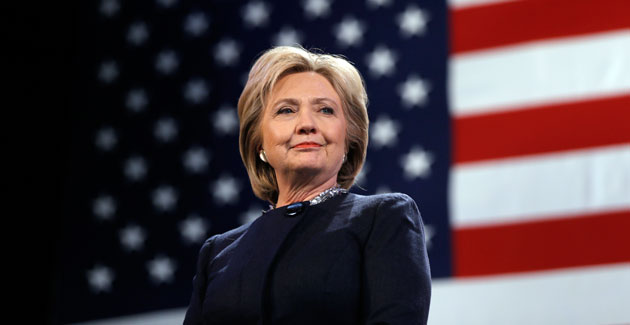Legal or legitimate? The 2016 US presidential elections and the Electoral College

The US electoral system shows a profound disjuncture between law and legitimacy. A system that so disenfranchises the masses of Americans is illegitimate. Democratic elections must be based on the popular vote.
‘The people have spoken. Donald Trump will be the next president,’ President Obama told the American people on November 14. The people indeed spoke. The majority elected Hillary Clinton, who leads Trump by over two million votes. This will be the second time in sixteen years that America’s popular vote has been superseded by the Electoral College.
Yet most American political leaders remain silent about the seeming irrelevance of the popular vote. The best Senator Sanders has offered is: ‘We may want to take a look at the whole Electoral College, which is seating a man for president who didn’t get the most votes. This is something we need a serious discussion on’ (USA Today, November 14).
However, the slogan chanted across the country – ‘Not my president’ – suggests that irrespective of the Electoral College’s legality, millions of Americans no longer believe in its legitimacy.
Legitimacy concerns the right of an authority to govern. In a democracy, the acceptance of that authority’s right to govern and the belief in the political process reflect popular perceptions that the elected government follows democratic principles and is accountable to the people, who express their will through the vote.
To take a well-known international example, nowhere has the disjuncture between law and legitimacy been more apparent than in apartheid South Africa. The apartheid system – an elaborate legal edifice to ensure white racial domination in all areas of life – was illegitimate, both in the eyes of black South Africans and, increasingly over the 20th century, in the eyes of much of the world. Its lack of legitimacy reflected its denial of equal rights and political representation to the black population.
The US electoral system, too, shows a profound disjuncture between law and legitimacy, a disjuncture that is today reaching a crisis. Historically, African-Americans have faced repeated obstacles to their electoral participation. Now, the Electoral College is effectively disenfranchising millions of Americans of all colors and ethnic backgrounds.
The Electoral College originated at the 1787 Constitutional Convention. In a direct popular election, the northern states would have outnumbered the southern slave-holding states, whose slaves could not vote. However, a compromise allowed the southern states to count each of their non-voting slaves as 3/5 of a person in order to increase the number of their electors. The more slaves, the more electors.
After the Civil War, the freed slaves achieved the right to vote through the 15th constitutional amendment. But white southerners imposed local and state barriers impeding African-Americans from voting. A century later, the 1965 Voting Rights Act overturned those barriers. However, in 2013 the US Supreme Court struck down section 4 of the act, which stipulated which states were required to have changes to their voting laws cleared by a federal authority. The impact of the Supreme Court decision was immediate. Freed from federal oversight, North Carolina, for example, passed regulations restricting the African-American vote. Barely were these overturned in July 2016 than local election boards implemented other restrictions. The concerted efforts across many states to suppress the African-American vote has been compounded by the American system of mass incarceration, which disproportionately impacts African-Americans, since those convicted of felonies lose their right to vote. As the black vote has been eviscerated in one community after another, whites have gained disproportionately in political influence.
The forthcoming Electoral College vote will be legal under the current law. But that does not mean that it will be seen as legitimate by millions of Americans. The African-American struggle for the franchise and the struggle for the popular vote to be paramount in choosing our president have converged.
Just as those who oppose the Electoral College and its decision must respect the law – while not forgetting the honorable history of non-violent civil disobedience against unjust laws – so politicians must respect the belief of millions of Americans that a system that so systematically disenfranchises masses of Americans is illegitimate. The Supreme Court must put a definitive end to the endless attempts to disenfranchise African-Americans, and the Electoral College must be abolished. Our democratic elections must be based on the popular vote.
It is ironic that just as South Africa gained its universal democracy at the end of the 20th century, so the disregard of the popular vote in the United States is becoming a major issue in the 21st century. The struggle for democracy in the US may well become, this century, what the South African struggle represented in the past.
* Allison Drew is Honorary Professor, University of Cape Town, and Professor Emeritus, University of York.
* THE VIEWS OF THE ABOVE ARTICLE ARE THOSE OF THE AUTHOR AND DO NOT NECESSARILY REFLECT THE VIEWS OF THE PAMBAZUKA NEWS EDITORIAL TEAM
* BROUGHT TO YOU BY PAMBAZUKA NEWS
* Please do not take Pambazuka for granted! Become a Friend of Pambazuka and make a donation NOW to help keep Pambazuka FREE and INDEPENDENT!
* Please send comments to [email=[email protected]]editor[at]pambazuka[dot]org[/email] or comment online at Pambazuka News.

